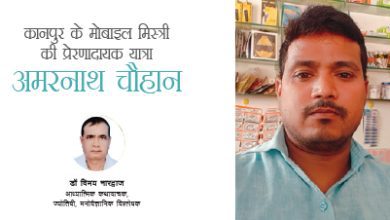A Day in the Life of a Bus Conductor
“Life is a mixture of joy and sorrow. Many say that all the sadness fades away in the end. One must conquer all the challenges with a smile.”
~ Dalai Lama

There are thousands of bus conductors in
India and many of them are employed by the
government. Every time you stepped onto
the bus, you would have seen him. There is very
little chance that he will miss you, even if you do!
His hands were stuffed with tickets, and his bag was
clinking with coins. Yes, we are referring to the bus
conductor. Ever considered what it would be like
to be one? Well, we trailed Sandip for a day to get to know what his day looks like from the time he reports to work. Sandeep Patil joined the service in Do you know how he spends his day? Find out
by reading on…

First stop: The booth where he collects his box,
which has tickets (numbered) for bus number 718,
coins worth Rs. 30 and a traffic register (TR). He
signs a register when he collects these. A TR is a very
important document that needs to be filled in at the
given stages during the drive. The bus conductor
has to note down the number of tickets sold at a
particular stage.
He is not allowed to keep cash more than the limit
stipulated to him, and if he is carrying more than that,
he needs to turn it in before he starts his trip. The
conductor is given a daily allowance for coffee and
snacks. When you travel by bus, do you notice the
man who sits by the door? He is the bus conductor.
When his shift is over, he comes back to the bus
terminus, gives in the money and tickets. He has to
balance the accounts, fill in the TR, and sign it. He
earns a percentage of the ticket sales as an incentive.
Incentives change depending on the type of bus
operated (express or normal).
Some other interesting facts we got to know are that a conductor wearing a khaki uniform has worked anywhere between one to 14 years. There are regulars with whom he exchanges a few words of greeting. He plays advocate, stopping passengers from playing music loudly and irritating fellow passengers or settling disputes with vegetable vendors… All in all, it’s a busy day.
He added that it was originally an exclusively male-dominated profession, but many women are now pursuing careers as bus conductors. He claimed that in Mumbai, they are still only employed temporarily. After a shuffle in government, these female conductors desire regular, permanent employment.
Bus Journey becomes painful when the conductor says, I will give change at the last stop – –Lone Warrior
This profession is also a mixbag of struggles. The job of a conductor is unstable, demanding and difficult. It is often looked down upon by society. It is a job, like that of a typewriter mechanic, that has been consigned almost to history. It has been so long since every corporation transport department was crying out for people to sling a ticket machine around their neck and become a bus conductor. But now things have changed after modernisation. With the advent of electric buses and digital ticket receipts, the employment of bus conductors is under threat. Many government agencies have started rolling out sans conductor buses.
Chala Pude Chala – चला पुढे चला पुढे (means… Keep Moving) …Ticket… Ticket… Ticket…
It was a job that had its ups and downs. It is obvious that he has a special fondness for those passengers who make the effort to talk to him. “For us, every once in a while, there comes a passenger who actually sits and talks to us. Telling them about myself makes me feel lighter, happier even. ” When people praise him for his courage, he refuses to consider that the job is more challenging than many. Conductors typically retire at the age of 60. Sandip is the epitome of success. He is helpful, independent, and shy. Team Café Social salutes these community helpers who contribute to the daily lives of a large section of the population in India. We are eternally grateful for their tireless service.

In addition to bringing stories from our daily lives, ‘Café Social’ seeks to foster an environment of respect for these community helpers.






